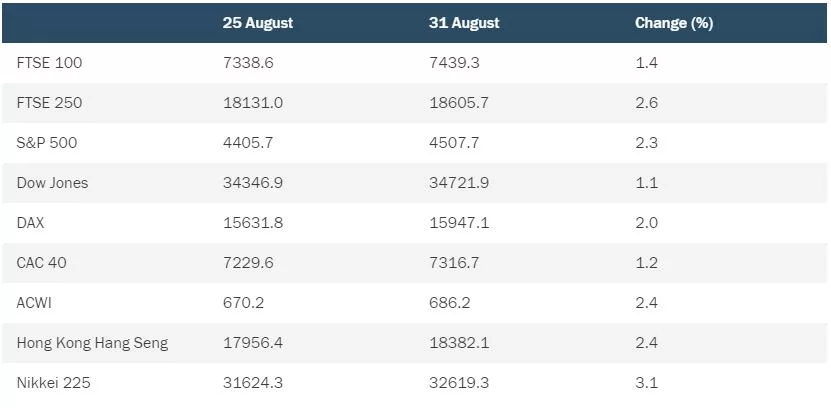Global stock markets ended a challenging month on a positive note following stimulus measures in China and reassuring economic data in the United States
The Beijing government’s latest attempts to boost the ailing Chinese economy early in the week received a considerably warmer welcome from investors than recent efforts. Meanwhile, markets were particularly happy to see signs that the US economy may be cooling sufficiently to make further interest rate rises unlikely – but not so rapidly that company earnings are at risk in the short term.
United States
On Wall Street, the Dow Jones Industrial Average ended trading on Thursday 1.1% up for the week so far, with the S&P 500 gaining 2.3%. Second-quarter GDP growth was downgraded to a small degree, while the number of new job openings came in lower than expected. July’s inflation figure, meanwhile, was in line with expectations. Overall, investors believe these indicators make a September rate rise considerably less likely, and bond yields declined as a result.
UK
In the UK, the FTSE 100 closed on Thursday 1.4% up for the week so far, with gains limited to some extent by weakness in the dollar as interest rate expectations in the US softened. Recent data highlighted ongoing difficulties in the housing market, with mortgage approvals dipping to a five-month low and property sales down 16% compared with 2022. However, government proposals to ease planning regulations boosted the share prices of the UK’s biggest housebuilders. Investors also welcomed signs that grocery price inflation is starting to ease.
Europe
In Frankfurt, the DAX index ended Thursday’s session up 2% for the week, while France’s CAC 40 gained 1.2%. Positive news from China and the US helped European stocks to advance, but news that the eurozone consumer price inflation rate remained at 5.3% in August (when a fall was widely expected) only increased the chances of another rate rise by the European Central Bank later this month. Germany’s economic struggles continued, with latest figures showing a rise in unemployment and a fall in consumer confidence.
Asia
In Asia, the Hang Seng index in Hong Kong rose 2.4%, but finished the month more than 8% below its July close. This week’s partial recovery was prompted by the Chinese government’s plans to slash stamp duty rates as it continues working towards boosting investor confidence and activity in the private sector. However, share price gains were curbed by further concerns about China’s real estate industry and data that showed a fall in manufacturing activity. Japan’s Nikkei 225 index of leading shares, meanwhile, advanced 3.1% given improved prospects for Chinese stocks and the diminished probability of interest rate hikes from the US Federal Reserve. Investors in Japan brushed off production problems at one of the country’s biggest automotive manufacturers, as well as a surprise increase in domestic unemployment.

Note: all market data contained within the article is sourced from Bloomberg unless stated otherwise, data as at 31 August 2023.

